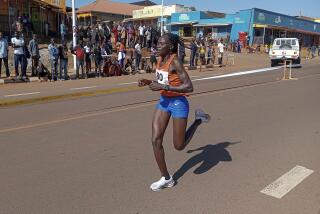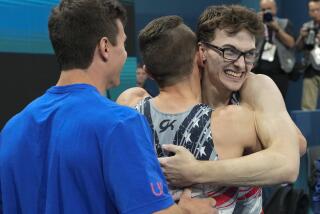A Dometown Girl
Below the Harbor Freeway in the homeless encampment known as Dome Village, residents have spent the past days gathering around televisions. They don’t want to miss a moment of Joanna Hayes competing in the Athens Olympics.
“‘People would walk around yelling, ‘Joanna is running! Joanna is running!’ when she was on television,” said Graham Foster, 49.
The petite Hayes, 27, is the daughter of Dome Village’s founder, homeless activist Ted Hayes. For the 34 men and women living in the 20 igloo-shaped structures in the shadow of downtown, the daughter’s dream of Olympic gold became a symbol of hope.
As Hayes crossed the 100-meter hurdles finish line in an Olympic-record 12.37 seconds in Athens on Tuesday, cheers and shouts broke out here, and a few tears fell.
“I jumped. I really jumped for joy,” said resident Chester Ward, 46, a Dome Village regular since the early 1990s. “To see that sister win that medal -- it sparked something inside me to see her cross that finish line. She just brought a lot of things to my mind; life ain’t easy, but I can do it.”
The Olympics mark a high point not just for Dome Village but for the relationship between father and daughter.
Bible-quoting activist Ted Hayes is homeless by choice, deciding in 1984 to leave his wife and four children in suburban Riverside and move to downtown Los Angeles.
Hayes, 53, said he made that choice after seeing a television report about Tent City, a gathering of homeless people in downtown.
“Why doesn’t somebody do something about this?” he asked himself. Then it occurred to him that he could be that person, Hayes said.
“I believe the Lord spoke to me that evening,” he said.
Joanna Hayes said her father’s sudden move shook the family. For years, she struggled with the fact that her father had chosen to spend time with the homeless rather than his family.
“I was only 6 years old when he started living downtown,” said Joanna, the youngest of Hayes’ four children. “As a kid, it was tough.... Some days I understood why he had done what he had done. But some days I would wonder, ‘Why would you do this?’ ”
Her older sister, Hadia, puts in more bluntly: “My father basically gave up his family to live on the streets.”
She remembers going to Los Angeles to visit her father, seeing him asleep on the street and breaking into tears.
With her father away, Joanna’s mother, Arlene, worked as a substitute teacher.
Joanna was a student at John W. North High School in Riverside when a track coach, Charles Leathers, saw her potential and steered her toward an athletic career.
Eventually, Joanna said, she used the turmoil of her family life to propel her.
“Strength and power come from struggle and pain,” she said. “Maybe things would have been better if my life had been different. But when you wake up in the morning and you know it’s going to be tough that day, that builds character.”
As Joanna was blossoming as an athlete, her father was becoming a passionate and high-profile community activist.
Soon after arriving in downtown, Ted Hayes emerged as the city’s leading voice on homeless issues and became a familiar face on newscasts and at news conferences. He helped organize tent cities around skid row before starting Dome Village. He even ran for mayor of Los Angeles in 1993.
All the while, he would return to Riverside on weekends to visit his family.
Ted Hayes said he had known Joanna was a born runner when, at age 2, she would run tirelessly between the far walls of their large living room.
“I mean for hours,” he said. “We wondered what was wrong with her.”
As Joanna grew older and politically aware, she came to respect the choice her father had made.
“Obviously, with my dad, there have been times when I’ve been angry with him,” she said. “But there are so many more times when I’ve been proud of him.”
“I will,” she said proudly, “always be the Dome Village girl.”
Ted Hayes was cheering in the stands in Athens this week along with Joanna’s mother and other family members.
At Dome Village, Hayes’ neighbors shared his excitement and followed his daughter’s every move.
Because Joanna’s events were not broadcast live, residents kept up with results on the Internet, then watched the races at night on television.
Hadia Hayes said she would go into her father’s dome to check results online.
“It was agony waiting,” she said.
Ted Hayes created the Dome Village encampment in 1993 as a place for the homeless to have medium-term housing.
Most of the plexiglass domes are divided in two, offering tiny living spaces with electricity and heat. Other domes are reserved for families.
The compound includes communal bathrooms, a kitchen and laundry room and a classroom where residents can learn computer skills. The encampment has been financed in part with grants from the U.S. Department of Housing and Urban Development as well as private donations.
“People who come here after living on the street come here tired, broken down,” said Foster, a former nightclub manager who has lived at the village for a year. He became homeless after the club closed and he discovered he was HIV-positive.
Residents are permitted to stay for up to two years as long as they “don’t become complacent and treat it like a motel,” he said. They must clean the communal areas as assigned and try to find employment or go to school.
Foster said he only met Joanna a few times during her visits to Dome Village but that the Olympics have made her seem like part of the community. He has been videotaping all of her heats, from her first race in Athens on.
“There’s been an awful lot of excitement about her,” he said. “She’s our champion. Watching her run is not going to be the answer to every problem, if any problem at all, but it’s very encouraging to have such a clear reminder of what hard work and discipline can accomplish.”
In that, Foster sees similarities between father and daughter.
“She is so much like Ted,” he said. “There is a freedom of spirit but also a determination. I see a lot of Ted in her.”
*
Minaya reported from Los Angeles and Krikorian from Athens.
More to Read
Go beyond the scoreboard
Get the latest on L.A.'s teams in the daily Sports Report newsletter.
You may occasionally receive promotional content from the Los Angeles Times.





